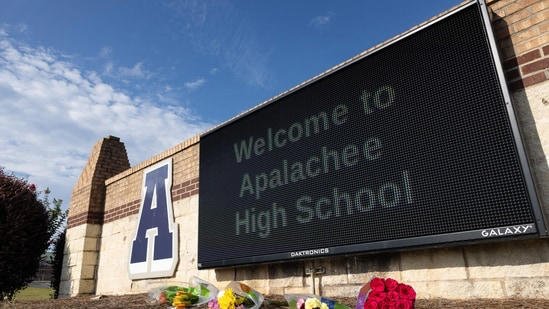The father of the alleged shooter in a Georgia high school tragedy has been arrested on charges of involuntary manslaughter, adding a new layer of complexity to an already heartbreaking case. The shooting, which took place at a suburban high school, left two students dead and several others injured, and has once again sparked national discussions about gun control, school safety, and the responsibility of gun owners.
The alleged shooter, a 16-year-old male student, was arrested soon after the incident and faces multiple charges, including murder and aggravated assault. According to authorities, the shooter used a firearm that belonged to his father, a critical detail that has led to the father’s arrest. Investigators allege that the gun was not stored securely in the family home, allowing the teenager easy access to it. The weapon was reportedly left loaded and unlocked, which law enforcement officials believe directly contributed to the tragic events that followed.
The father has been charged with involuntary manslaughter, a serious criminal offense under Georgia law. The charge implies that while the father did not intend to cause the deaths, his negligence in securing the firearm played a pivotal role in the outcome. Involuntary manslaughter can be applied when someone’s reckless or careless actions result in another person’s death, even if the death was unintentional.
This arrest has thrown a spotlight on the broader issue of parental responsibility in cases involving gun violence. Gun control advocates have long argued that owning a firearm comes with the responsibility of ensuring that it is stored safely, particularly in homes with children or teenagers. The ease with which the alleged shooter was able to access the weapon has fueled calls for stronger laws governing the storage of firearms. Some legal experts believe this case could become a landmark in how gun owners are held accountable for not securing their weapons, especially when minors are involved.
Gun laws vary significantly across the United States, and while many states have strict regulations regarding firearm storage, Georgia’s laws are relatively lax. This case could signal a shift in how the state addresses these issues, as it presents an opportunity for lawmakers to revisit Georgia’s gun control policies. If the father is convicted, it may set a precedent for holding gun owners criminally liable in cases where their negligence leads to violence.
The father’s defense team has argued that he is being unfairly blamed for his son’s actions. While they acknowledge that the firearm belonged to him, they claim he had no knowledge or reason to believe that his son would use it to commit such a violent crime. They insist that the arrest is an overreach by law enforcement, and that the responsibility should lie solely with the shooter.
Meanwhile, gun rights advocates have pushed back against what they see as an attempt to politicize a family tragedy. They argue that the focus should be on the actions of the shooter, rather than on the gun owner. Holding parents accountable for the crimes of their children, they argue, could set a dangerous legal precedent, especially in cases where the parents had no direct involvement in the crime. This has become a key argument in the larger debate over how much responsibility gun owners should bear when firearms are misused.
On the other side, advocates for gun safety argue that this case underscores the need for federal legislation mandating the safe storage of firearms. In their view, such laws could prevent future tragedies by ensuring that guns are not easily accessible to minors or individuals who may use them irresponsibly. This case, they believe, highlights the deadly consequences of unsecured firearms in the home and the urgent need for reform.
The high school shooting has devastated the small Georgia community, leaving families grappling with grief and searching for answers. Vigils and memorials have been held for the victims, while parents and students have called for stronger measures to prevent similar incidents. While school safety initiatives, mental health support, and anti-violence programs have been proposed, many feel that these efforts must be accompanied by stricter gun control measures to be truly effective.
As the legal process unfolds, the case will likely continue to serve as a flashpoint in the broader national conversation about gun violence, parental responsibility, and the legal consequences of failing to properly secure firearms. The arrest of the father is a reminder that the ripple effects of gun violence extend far beyond the immediate crime, affecting families, communities, and society at large. While the debate rages on, the focus remains on ensuring justice for the victims and taking meaningful steps to prevent such tragedies in the future.

